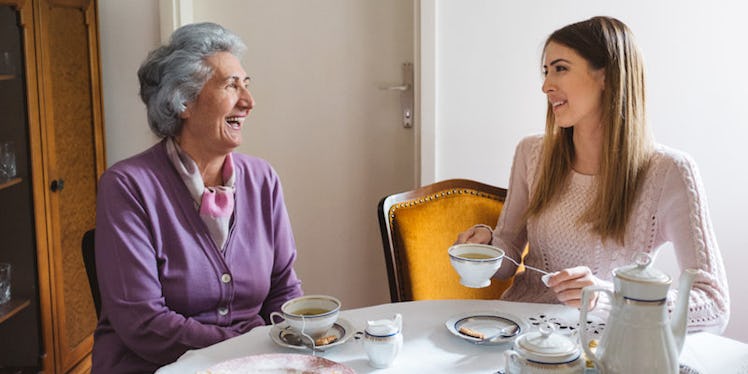
How I Found Peace In My Own Life Through My Grandmother's Dementia
A lover and a feeler, you could always read my grandmother's thoughts through her eyes.
If you upset her, her eyes would look toward the ground in pain.
Years have passed and my grandmother has stopped looking toward the ground. She's always looking up now, wide eyed and full of wonder.
Over the course of the years, she's fallen into dementia. As I've observed her facial expressions, I've seen more joy in recent years than I did when I was younger. Her dementia has made her progressively happier.
But why?
My grandmother was a romantic in her younger years -- an artist and photographer married to a mathematician.
Her life was full of feeling, full of emotion and full of holding on.
I see parts of myself in my grandmother and how she was when she was younger -- easily hurt with a face that can give you an answer without saying a word.
We both hold onto pain. We both hold onto things that have hurt us. We both have a hard time letting go.
We hold onto things that have hurt us, and we have a hard time letting go.
She no longer holds on.
Dementia has knocked out my grandmother's pain. She's no longer sensitive to hurtful words. She's no longer concerned with what she looks like.
In her mind, she doesn't remember what the world thinks of outside appearance. The past is forgotten, and the future is out of sight.
She's simply concerned with what is in front of her because what is in sight is what matters to her most.
When I last visited her I told her she looked pretty. She responded, "I'm pretty because I'm happy."
Her oblivion to the past and to the future is what keeps her happy living in the present.
But I realize while losing many bad memories, she's also lost many good ones.
She's lost the memory of days when the world just felt right.
With pain we're able to recognize what's good. Pain is essential to true, genuine happiness. However, we can take a lesson from how my grandmother lives.
With pain we're able to recognize what's good; it is essential to true, genuine happiness.
We hold onto pain so tightly it takes away from what we have in front of us. We constantly worry about the next second, minute and hour it takes away from the now.
A life without pain would involve no goodness; it wouldn't be recognizable if we didn't have something painful to hold it up against and compare it to.
My grandmother feels no pain in the present moment. She is painlessly, fully present.
How can we take a lesson from her?
Zig Ziglar once said, “Two things to remember in life: Take care of your thoughts when you are alone, and take care of your words when you are with people.”
By addressing our pain in moments when the world is quiet, maybe we can finally start to take in the present moment when the world is loud and filled with other people.
By addressing our pain when the world is quiet, we can take in the present when the world is loud.
By addressing what causes us to feel unsettled, we can feel settled in the moment.
By thinking twice before we speak, we can find peace that what we do and say in the present is what we truly want.
Through memory loss, my Oma has let go of all of her pain.
We might not all be able to fully let go of pain, but we can come head to head with it. We can find peace with our thoughts and our being.
When we have peace, we find the present, we enjoy what's in front of us and we take it in, we find gratitude for everything we've been given.
When we have peace, we have everything.